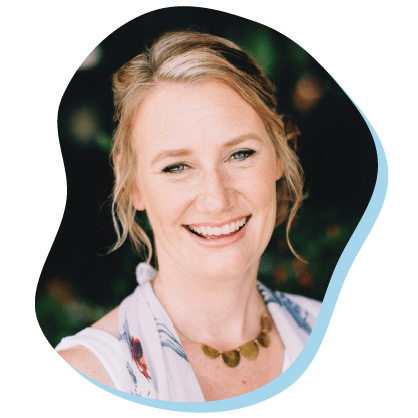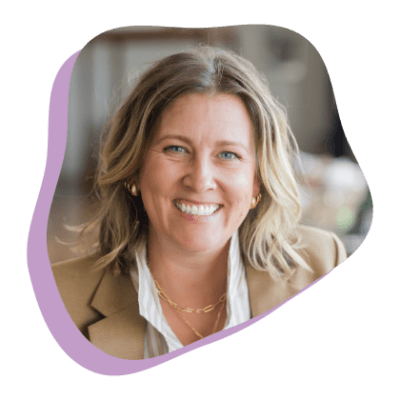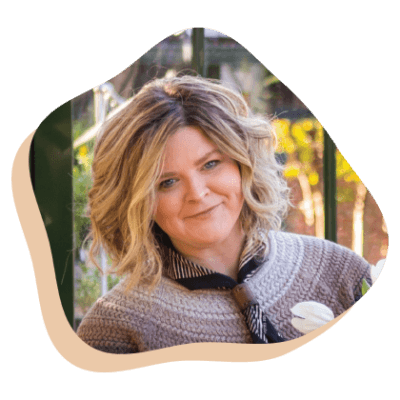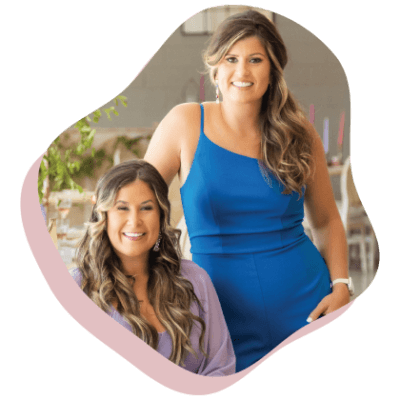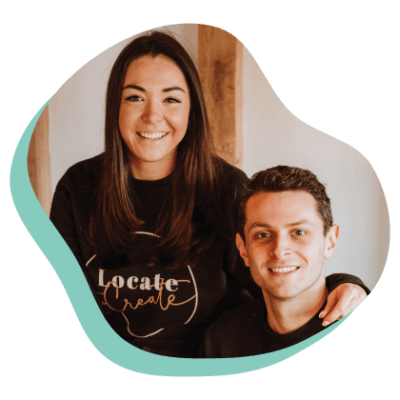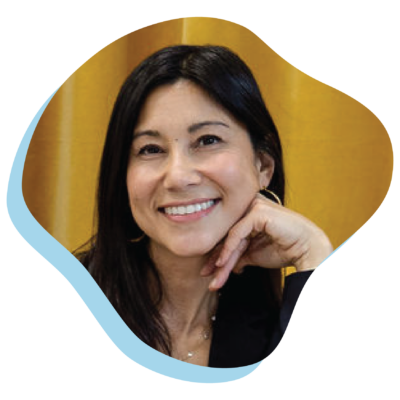Hello and welcome to the Trunk Show. I’m your host, Allison Howell, here to talk with leading professionals about their event rental businesses, hard-earned wisdom, and ongoing adventures in the industry.
The show is brought to you by RW Elephant, mighty inventory management software designed to help you conquer the chaos in your event rental business and reclaim your creativity, because the world needs more of the beautiful events and environments you create!
In this episode, you’ll hear my conversation with Christie Zangrilli. She’s a serial entrepreneur and graphic designer by trade who brought together her creativity and problem-solving skills when she started Party at the Moontower Rentals in Austin in 2016.
Christie’s focus on design and consistency throughout her brand experience has helped her grow Moontower Rentals to the operation it is today. I can’t wait for you to hear her story of triumphs, challenges, and adventures along the way.
Christie Zangrilli: I’m Christy Zangrilli. I’m the co-founder and CEO of Party at the Moontower Event Rentals.
We are located in Austin, Texas. We officially launched in October of 2016. So coming up in a couple weeks will be our eighth birthday. So we’re really excited about that.
Allison Howell: Yeah, that’s very exciting. Let’s go way back. Before we talk too much about Moontower, tell me about growing up. You grew up in a small business family, right? Tell me about your childhood.
Christie Zangrilli: So my dad is a restaurant owner, entrepreneur, and his business, which is called Dante’s. It’s over 60 years old. He just started really young working in high school for a guy who had a pizza shop there. And then he started to go to school at Penn State and helped him open up a shop there.
He ended up dropping out of school and bought that restaurant from the original owner. And that has just grown into a really big restaurant company, if you will. My mom is an artist, and so she was part of the business and did all of the aesthetic, right? So, the interior design, the logos, the advertisements. She would even make art for the walls for the different places if she needed it.
So I just saw, it was natural to see that, hey, if you need something you do it. You make it, right? You make it. You need a piece of art? You make it.
Allison Howell: So you grew up in this entrepreneurial family. You go to college; you know wanted to do design. Is this because you’re half your mom half your dad?
You’ve got this design the artist and analytical brain happening or how did you land on design in college?
Christie Zangrilli: I originally went to NYU for business thinking I would probably go into the creative, you know marketing and I realized in the business school, that was more of the numbers side of marketing.
And so then I switched to communications design, which is the closest thing they actually had to a graphic design program. Design just seemed natural, like I was definitely more creative than business minded and just felt the need to express that somehow.
Allison Howell: It seems like you’ve got that problem solving and creative brain happening. So you graduate from college, you start your own design business, and do things just take off from there or what happens? How do you grow from there?
Christie Zangrilli: Because I went to this program that wasn’t a full like studio art graphic design program I left with some portfolio pieces but not enough on the caliber that people were hiring recent grads for design positions.
So I actually again in a very, I think, just natural thing for me to do is figure out how to do it.
So I continued to take classes. Web design was obviously growing at that time. So I took a lot of classes. I learned html. I learned flash. So about two years later of doing some continuing education and realizing that, hey, I have a knack for this, and I knew that is the path I wanted to take for sure and felt like I needed to get some further education.
So I applied to grad schools and ultimately decided to go to UT MFA design program here at UT. And so that’s what brought me to Austin. Before coming to Austin, I had no clue what it was like. So I would come here and be like, this place is so fun and cool. And it was always during these times where fun stuff was happening.
So the impetus really is that my best friend was here and that it was just a fun place to party in.
Allison Howell: I think sometimes people, especially in this industry, discount the life experiences and the other parts of training and the things that have really helped them cultivate their eye, and their style, and their business sense, and I think so much of that is required in order for you to be successful at this. Because there are tons of people who are starting businesses like this, putting up a shingle and say, “Hey, I’m a rental company,” and you see them come and go because there’s no barrier to entry, right?
You can buy a couch and start renting it out tomorrow. And it’s really easy to start, but the people like you who have longevity at this, the things I noticed, those trends are, wow, you’ve got a really great eye. That’s not just random. You’ve trained it either professionally or through school or through a lot of time doing design work in a number of ways.
You also have some exposure to business, right? Either you grew up in a business family or you started multiple businesses or you worked in a couple of different businesses that didn’t go well until you got to this point where you started your own. And then another thread that I see through the people who have that “sticktoitiveness,” that longevity, are really just people who can see the bigger picture.
Like they see, oh, I’m not just like dropping off stuff at a wedding or not just like renting tables and chairs. You recognize hey I’m creating culture here. This is the stuff of celebrations. This is what makes up these milestones and memories for people.
And on the one hand, you don’t want to take yourself too seriously, but on the other hand, this is really important. And you recognize that what you’re creating in your collection and your company and your brand is influencing.
The kind of celebrations, the very stuff of our culture, happening around you.
Christie Zangrilli: Exactly. I think that’s, you hit the nail on the head. The interview’s over. That is clearly the reason why I’m in it.
Allison Howell: Tell me then, how do we get to Party at the Moontower? Where did this idea come from? At what point does this start bubbling up for you?
Christie Zangrilli: I graduated school thinking I was a total failure. And what the hell did I just do for two years? And I was just watching my best friend Tenaya Hills Robinson.
She was working. She is still working for a company called Bunkhouse here in Austin. I was planning my wedding. It was so DIY, I didn’t have any clue about the event industry, about how you need a planner. I was just like, oh, I’ll just do this myself. Like I think. So many people do.
Allison Howell: Well, already you’ve described that’s how you grew up. So you just make it yourself, right?
Christie Zangrilli: Yeah, and plus being a designer I was like I like this stuff. Why would I hire somebody to do all this for me? I was super excited I letterpressed all the invitations. I letterpressed just so much stuff. I really like paper and the physical stuff.
So I was really into doing letterpress stuff, but nonetheless, we found this company, YEAH! Rentals, which I know, because they have been a guest. I’m sorry. Remind me of his name.
Allison Howell: Michael Antonia.
Christie Zangrilli: Yes, Michael. And I think I fangirled him at the first Lend & Gather that I went to like, “Oh my god! You were my inspiration!” We saw what he was doing out in LA, which was very focused mid-century modern, very colorful, cool rentals. And we were like, wow, like there’s nothing like this here in Austin. Loot here in town who we were all aware of, and they’re so successful, at the time they were just doing vintage rentals and they were pretty small at that time as well.
Yeah, we just had this idea. And by the way, this was a good one, two, three, four. This was almost four years before we actually launched Party at the Moontower. But we had this idea. And we were like, wow, nobody’s doing more colorful, fun rentals. Austin is blowing up, right? There’s all these festivals, all these conferences happening.
We think there’s this hole in this market here for this thing. And so her and I just kept talking about it and talking about it. And then we started talking to other people about we have this idea and it just got to the point where I think we couldn’t not do it because we had told too many people about it.
So we did a business plan. I asked for a lot of favors from a friend of mine. Scott Collier who used to do venture capital consulting and stuff. I was like, “Can you help me put a pro forma together for this business plan?” Put a business plan together and then we just did a for friends and family fundraising kind of round, if you want to call it.
And we did, we barely asked for anything. We asked for enough money to–and by the way, looking back, we did not ask for enough money for sure. When it actually came down to it.
Allison Howell: Everyone says that when they look back, right? Everyone says that.
Christie Zangrilli: We thought it would be enough to get these initial rentals, initial pieces we wanted, and also pay the salary for me for a year or so.
Allison Howell: Do you mind telling us what the number was that you asked for?
Christie Zangrilli: Yes, we asked for a hundred and fifty grand. And that was mostly for–we bought twenty big harvest tables. Big ones. The eight foot ones and the folding leg ones that are for the event industry.
And they’re pretty expensive. We bought those. And then we bought two hundred of two different kinds of chairs. We went for these designer chairs by a designer called Thonet and they are manufactured in the Czech Republic.
And we got them direct from the actual designer, which again, looking back, had I known more, I would have just gotten probably knock off ones, right?
They are still our biggest renters. We have them today and actually maybe investing in the real ones was good because they have lasted. There are a couple things, though. They do not stack like what the hell was I thinking?
Another super newbie thing. All of my fulfillment, my delivery guys are like, we have to teach people how to stack them in the truck, like if somebody gets all two hundred, it takes a whole truck up. They stack butt-to-butt, other than that, they don’t stack. So there are these funny things that we did in the beginning that I would have done differently probably. My partner, Tenaya, had a full-time job and she wasn’t in a place where she could leave that.
And so it was discussed that I was going to be the operational partner. So I had her and the family member that did the initial investment. So he was a part owner as well. And then there was another woman named Jen that was an acquaintance that also had a design background and an accounting background.
And she was interested in helping out with the business. So she came on as a partner in the very beginning as well. So when we launched, it was the three of us launching this business. And again, like I said, we started the idea was a seed idea in 2012 and we launched in 2016 so it took a while to come to fruition and of course there are kids. I had a baby. Tenaya had a baby. There’s other life things that were happening as well.
And I don’t know why I thought having a baby and then starting a business literally six months later was a good idea, but there’s never a good time.
Allison Howell: Tell me a little bit more about the collection that you’ve built.
Christie Zangrilli: We’ve spent a lot of time building something or buying something that we think is going to rent and it doesn’t.
And so I think what I learned from you, Allison, which you’ve always said is like more inventory doesn’t mean more money. And so we’ve really taken that to heart and that we don’t just buy things that we think are cool. I mean sometimes, like I said, there are exceptions. I would like to say we’re more intentional and focused and super planned out on what our collections are, but they are largely driven by what the market is asking for and what also feels on brand to us.
Allison Howell: And it seems like that’s really a key because you are now in a market that is, I’m not going to say fully saturated, but there is some competition, right? You’re not the only game in town. And while you do have a unique collection there are more options now than there were when you started. And so I’m just wondering if you have any insight about how you think about competition or think about yourself in relation to your competition, because I know that can sometimes feel overwhelming for some people starting out.
Either they think they’re the only game in town and then they realize, oh, there’s someone else doing something similar and then they get really deflated. Or they are chugging along, doing their thing. They get something great in their collection. And then somebody else down the street buys something really similar.
And that feels like wah, wah, wah, right? So I imagine you’ve had some similar experiences. How do you view competition, especially in light of your inventory? Because it seems like honing your collection and having that be pretty specific and particular is a huge part of what you’ve engineered as your competitive advantage, right?
Christie Zangrilli: I have a friend, she’s a brand professional. She does this with really big companies and she gave me a super homie deal to do a brand audit. And she made us realize that we’re never going to win on inventory.
Never. All of these, what I call big box companies, the kind of more traditional companies that have folding chairs and tables.
All of those companies have furniture lounge rentals, just like we do now. They’ve obviously seen that’s what people are asking for. And so they’ve gone and bought them. They’re coming from a kind of a different place in that, like their business model where they’re making their money is on these like big box rentals.
This is the sidearm of the other furniture rentals is probably just a nice to have, and they’re not as focused on it from a design perspective or whatever. But I guess I say that because all those people, she put it a good way. She was like, tomorrow, this big box company could literally go by every single thing that you have.
So inventory is never going to be your unique differentiator and so I was like, oh man, like that’s super scary but, again, made us–made me realize how important all of the brand pieces were and how that goes into operations.
So again, what are the things that you are winning?
Like what can you win at? Type of situation. And I think Starbucks is a really great example. I don’t think they’re trying to win a coffee. Obviously not. Everybody would say their coffee sucks. So if you can’t win at like the main thing you’re doing the coffee or your furniture, right? What can you win at and what’s important to you? And so, actually one of your speakers talked about these different areas like that you can focus on.
Allison Howell: Jeff Tanner.
Christie Zangrilli: Yes!
Allison Howell: In 2020. I was actually going to bring this up with you. I was going to say, okay let’s go through them.
Here are the five factors. Okay. Access. So either convenience or location. Price. So operational excellence is price. Customer service. So the service people are getting. Customer experience, which is differentiated because it’s not just how you’re answering the phone or giving them what they want or a discount or whatever. It’s the whole brand experience, which is what you’re talking about. And then the fifth one, oh, it’ll come to me. Give me a second. Features. So in your case, that would be inventory, right? So the inventory you actually have. Or maybe in your case, the idea that you could create something custom for them or you can get it if they want it.
Christie Zangrilli: This was really well broken down by Jeff and when I heard that I was like, oh, yeah this is such a good way to think about it. This is what we were doing, right? And that’s a good way to talk about it. But yeah what are these things though? And these are the things that create brand for you and the features is not something we can be number one at and price is definitely not something I think in the boutique event industry that, or furniture industry that we will win at, well we could win at and undercut all of the competition, but that doesn’t do anybody any good.
Allison Howell: It’s a race to the bottom because you shouldn’t price yourself lower just to win on price. You should only price yourself lower if you have the operational excellence or the operational efficiency to actually have your costs lower. Which isn’t going to be the case if you’re a smaller organization, right?
Christie Zangrilli: Yes, the delivery logistics stuff alone, like that accounts for so much of why furniture, this furniture is so expensive. We try to, when we explain it to clients, newer clients, or couples that are coming to us that don’t have planners. Hey, moving this stuff around is not easy, and the logistics of this getting in and out is not easy.
So yeah, price would never really be one of those things. And this is something that we have been honing this entire time. And that was actually part of the exercise I think that we did with Jeff, he was like, okay, rate where you are now. Okay, we think we’re number one in customer service and number two in client experience.
But like where do you want to be? And so this can be an evolving thing. And so our brand personality is fun and friendly and so we make sure that comes off in our communications with clients and the type of people that we hire. More recently, we started doing EOS, which is a business structure that you can use to run your business.
It doesn’t matter what industry it is. It’s a framework to run your business on and we do it with a coach. This is not all new stuff. It doesn’t matter whether you’re doing EOS or some other thing. Everybody wants you to come down to what the core values of your business are and what your goals are and all that kind of stuff.
And I’ll use all of that to then guide the type of people you’re hiring, and then, therefore, the experience you’re giving to your client through all of that stuff.
Allison Howell: Because at the end of the day, like you’re saying, the company down the street can buy what you have, but the experience that your clients have of you and all the people at your company has to have consistency, right?
Because if you’re presenting this fun and friendly approach and your whole sales team is, but then the delivery crew is gruff and not helpful. And that’s the last taste in their mouth. It’s like, wait a second. That’s not what I thought Moontower was like. So it actually, you think on the one hand it’s fluffy, but on the other hand, it’s the stuff, right?
Like you could have the best furniture. And have it delivered by a guy who doesn’t care about it. And it totally blows the whole experience.
Christie Zangrilli: A hundred percent. And I will say that is the biggest pain point of me and every other single rental company out there. I guarantee you. We should take a show of hands at Lend & Gather.
What are you dealing with? That’s the thing I ask other rental company owners about when we come to conferences like yours is all of us are just like, oh my gosh, how do you schedule? How do you hire? All of these things on the delivery side that are, it’s just a lot of moving parts. It’s a lot of moving parts.
Allison Howell: Speaking of moving parts, you started with investors and then eventually you got to a point where you realized, hey, I want to be steering this ship that is absolutely not sinking on my own. So tell me a little bit about how you come to those conclusions and how you approached those people.
Just to be clear, at Lend & Gather, Christie’s going to be part of a panel where we’re going to be discussing maximizing the value of your rental business. We’ll be talking with several people who’ve either bought or sold a rental business in the last year or so. And they’re going to be talking about how they came to their evaluation of the business, the negotiating process, how they might do it differently going forward, all those things.
So we’ll talk about the nitty gritty of actually the transaction at Lend & Gather. But I want to hear from you now, Christie, about the process of coming to this place. And then how did you navigate it relationally?
Christie Zangrilli: I have been the only managing member. The other partners are just members and they have an ownership percentage. I think this would be my advice to people that are about to start and take on partners or take on investors or whatnot. Had I been smarter, I would have thought oh, hey, this is going to be really successful one day. That’s not to say I didn’t think I would be successful, but when you’re bootstrapped, basically bootstrapping a company, like I said, the investment money paid for inventory and the rest, we are basically bootstrapping.
You’re just thinking about making ends meet on the regular. You’re not thinking about what happens when this business is making millions of dollars or whatever it is, right? And so the idea that you would have to share in the wealth of your work down the line at some point, it’s just not a big thing in your mind at first.
So I would just suggest thinking about if this was huge, right? And if you’re the only one working in it what would that be worth to you? Obviously, there’s a lot of value in what my partners brought in the beginning of the business, but if somebody brings value in the beginning and then ten years later, they’re not, they did that one time.
Is that, you just have to evaluate, the percentage that they have is going to make sense down the line, no matter what happens to the company. So that’s just a word of advice about that in general. And then also, which is such a no brainer to which everybody says is like, be so clear in your legal and your company agreement what happens when XYZ happens, or this happens, or that happens, and we just did a legal zoom LLC legitimately and didn’t ever look at it again, and so that’s a little bit part of my jump and figure it out on the way down.
Like, I’m not gonna spend a ton of money I don’t have on a lawyer. I’m gonna spend $60 doing a legal Zoom so I can just get this off the ground, and then I’ll think about it after. I actually think that is the way to go, truthfully.
Allison Howell: In some ways, you don’t know what you don’t know. And even if you hire the lawyer, you don’t necessarily know what the pitfalls are going to be to tell him in this particular situation unless the person you’re talking to has experience in this area, right? So it seems to me like what you do is, if you’re thinking this through, have a conversation with Christie Zangrilli and then do your legal zoom.
Christie Zangrilli: If anybody wants to ask me anything, just email me literally. I am happy to share any kind of knowledge for free. Knowledge is power. You could look it up too, but I’m happy to share with you what at least my experiences.
Where I misstepped is that I think that is the way to do it if you’re starting a small business and you don’t have a ton of money, is you just do it, right? And so you do the basic things we needed to get that legal zoom paperwork done because we needed to open a bank account and you need to be a registered business in Texas to do that. Where I went wrong was very quickly after things got up and running, maybe say a year after whatever we should have then gone back and reevaluated everything.
Allison Howell: Well, I mean, that’s a good practice no matter what, right? Whether you’re thinking about an exit strategy down the road, or whether you have partnerships, or anything like everybody should be thinking about that on a yearly basis. Hey, does this still work for both of us? Really fairly, talking about the distribution of work.
Does this account for the ways that we’re putting into it? And if not, should it be adjusted? How can we adjust it in a way that feels fair to both of us, right? And the thing is, if you think, oh, that’s going to be so uncomfortable, then maybe you should consider not being in a partnership. Because if you can’t have those kinds of conversations, then it’s going to be really hard for you to be in a partnership with anybody because those conversations are required, right?
Christie Zangrilli: Yeah, I just didn’t know part of it is fear, like “Oh, I don’t want to offend my friend,” or whatever it might be. But I think if you go into it, somebody like me being like, hey, we are going to reevaluate once a year, it is planned. Let’s stick it on the calendar. We will hire somebody to do it. It becomes less uncomfortable because it was pre planned versus a reaction to something happening that seems more confrontational or something. 2022 when I think everybody was experiencing the post COVID event boom, we grew and we also took on delivery in-house. We were literally using a third-party delivery and up until that point.
We took delivery in-house because we control it way more, right? Like, make sure they’re wearing the uniforms. The third-party guy we had just would roll up in whatever random clothes he was wearing. So as we were taking that on, we grew from four people to, I think, four to eleven full time people in just 2022.
That’s actually what the impetus for us joining EOS. Which, by the way, if anybody is in a growth phase, I would highly recommend using EOS. And hiring an implementer through them to put the structures and systems in place to handle the growth. And we did that on recommendation of another business owner friend who is just a little bit ahead of me in terms of years and experience.
And I have always looked up to her as a mentor. She owns a really successful day spa company here called Viva. She was like, “Christie, if we did this years ago, we would have double the amount of locations.” I was like, okay sold. I need some help. Let’s do it. So that’s how that decision came.
It wasn’t like I toiled over, looking at researching this stuff, but nonetheless, we grew really quickly in that year. All of a sudden, I had a lot of, I don’t want to say HR problems, but all of a sudden I became an HR department.
And I’m literally losing sleep over employees, there’s always, people or people, there’s always something. Not that it was always bad drama, but like just managing people in general, hiring people, you’re liable, right?
You’re liable for them as the business owner. I personally am liable for their well being. And I’m also personally liable for keeping them paid. I was at the point where I was like, if I’m going to shoulder all the additional stress of having all these employees and also the business was growing and doing really well, I want to be responsible for all of its successes.
And what that also means is I’m taking a risk too, because now I’m responsible for all its failures as well. If the business failed, if we were in debt, it would have been better for me to keep the partners because it wouldn’t just be me who is responsible. They’re all responsible too.
Allison Howell: Yeah. No, I feel like you’ve really given us a lot of insight into what the process was like for how you came to that conclusion that this is the direction you wanted to go.
And it seems like it wasn’t just straightforward. You didn’t just get to say, “Hey, I’m ready to buy you out. Are you ready to be bought out?” You had to negotiate and have conversations and you brought numbers to the table and they brought numbers to the table. Then you’re thinking about your personal relationships.
Christie Zangrilli: Yes. And you typically don’t just buy somebody in one fell swoop, but you do have to have the capital to buy somebody out, right? That’s an additional payment that you’re paying out. So you have to have the cash flow to not only support your business overhead and your operational needs, but then whatever additional partner payouts that you’re doing as well.
So, while I had feelings of wanting it to be more my own, maybe earlier, it wasn’t very realistic until the past couple of years.
Allison Howell: Talk to us about the future of Party at the Moontower. You’re moving into a lot more custom work these days. Is that right?
Christie Zangrilli: Customs was on the list of our services when I first launched our first website.
It was always something that I wanted to do, but then I realized I actually didn’t know how to run a rental company first. And then you do this custom, like the custom makes things a different beast in a way. So I kind of had to learn how to run the rental company first. And now that I feel like we’ve got that down pat, we were like okay. Who do I need to hire? Is it somebody more design focused? Is it somebody more building focused?
We do have a builder, a carpenter, Build Engineer is his title. And he’s a big part of this. So it’s building up other third party vendors, artisan makers, and just figuring out the SOPs for how this side of the business works in conjunction with the rental side, because it’s different. It is different and thought we were just in a place that we were rocking and rolling on like our operations of the rental side and again, this is all learned from Lend & Gather, just so everybody knows.
Paisley & Jade were the first ones that I saw that gave an awesome talk. I think I might have paid them to get copies of SOP templates or something like that. Developing our own, just being so strict on recording them and can write great SOPs all day. It’s following them and making sure it’s communicated and all that stuff.
That’s the pain points of the everyday, right? That’s just the never ending kind of situation.
Allison Howell: And now I’m wondering, in addition to trying to get people to actually follow your SOPs on the rental side, do you think it will be at all difficult to maintain the brand or the Party at the Moontower flavor while offering custom work, because I know sometimes people can ask for things and you’re going to want to do some of that and sometimes not, or not in the way they want. Do you think that will at all be difficult?
Christie Zangrilli: That is a great question. I actually hadn’t considered it from that point of view. My experience so far. We actually are baby stepping into this, mind you, didn’t want to come out of the gate being like, we’re going to do the whole stage facade for Austin City Limits Music Festival or something like that.
We’re starting small and it’s like custom photo backdrops for weddings or for corporate things.
Allison Howell: Or for pickleball tournaments.
Christie Zangrilli: Yeah, pickleball tournaments. You know, things that we can think we’re building just, wall things, cool looking shelves that you can brand, right?
Everybody’s looking for those brandable moments. That’s where we’re getting to stretch our creative legs to be like, okay, and this can be thought of in the wedding aspect too, right? The wedding brand is the couple, right? The couple’s name or whatever design, like theme that they’ve chosen.
They’re very much the same as a company where the company has their brand name and their own personal aesthetic that they’re trying to get across. So it’s been such a cool design challenge. Again, going back to design thinking to say, hey, the parameters are that we need to build things that are neutral enough, right? Not totally out there.
And so while we have wanted to lean very hard into this Austin, cool, funky thing at the end of the day, if you look at our stuff, it’s pretty neutral. So it’s finding those pieces that are neutral, but well designed. And I think, that’s like the key guiding.
Allison Howell: Right, it seems like that’s the key to the profitability piece of the custom work is making sure that at least some elements of it are reusable, because otherwise when you’re reinventing the wheel every single time, you’re probably going to have to price it so high that it’s not going to be appealing to the clientele or you’re not going to be pricing it high enough to actually make any money on it.
Christie Zangrilli: Customizable. That’s probably a better word for it. These are like backdrops, like archways, right? And you get, with the price comes, you have to pick a color. And you can put some sort of vinyl graphics or CNC cut logo or something like that. We’ll do that for you. That’s where we are starting, right? That’s most of the stuff that we’re doing.
Are these sorts of pieces that are customizable and then you can start combining them in cool ways, right? And starting to get a little more creative. Like maybe somebody wants to hang, I was doing a Western theme and we start hanging cowboy hats or whatever it might be. And then there’s the full fabrication piece, which is where we’re going also.
And that is where we felt like it was worth it for us to start this other arm of the business that we do think it’s a profitable arm, although it is different. It’s different pricing. It’s different processes, all that kind of stuff. And that is what, like I said I’m trying to figure this out myself to figure it out and then we’ll go from there, but that’s the stuff and the big creating cultivate stages or like other big conferences where these you know, they’re totally custom built backdrops and structures and stuff like that we would we are charging full price to build those and we’re not expecting to rent them again, right? Like they might go into a recycling bin.
Allison Howell: It sounds like what you’re talking about is Kaizen, the Japanese principle of always getting better. You’re looking at these SOPs and saying, “Okay it’s great, but can it be better? Can we improve it?” So this concept of continually improving but also there’s a little bright shiny object syndrome in there, right?
Christie Zangrilli: Oh my god, my team. They’re like, “Christie, you will just swoop in, commandeer somebody because I have an impulse to do something. And it’s endlessly annoying.” I understand. I’m trying to be better about it, but yeah.
Allison Howell: Is Party at the Moontower the business you imagined it would be when you started?
Christie Zangrilli: No, that’s so funny. Cause it’s like, of course I thought it would be successful or I wouldn’t have tried to do it. But I’m like, it was hard at first to give up that. Like I was the one that was designing all the lounges for the clients and blah, blah, blah. And then you hand it off and you think other people can’t do it as well and they actually do it better or different in ways.
And you’re just like, wow, that’s so cool. And so, and I, the other part too, is I think I feel so honored that I can support… I’m going to get, totally this honestly is really important to me. I think that I’m sorry, like my team actually are probably if they were to listen to this be like, “Oh, Christy hasn’t cried yet.” Because I cry when I talk about things that I care about.
The people have been my biggest awesome surprise and how it’s better is that I think that really am happy that I can provide. I really care about my employees because I am providing a livelihood for them and not like you can’t go somewhere else, but if you’re here and we’re all working together again, and goes back to some of the branding and all that kind of in the culture and core values, like I want to it to be a place where we all are enjoying spending literally forty hours a week plus of our time that is actually the one thing that this EOS program that I’m in really leans into is that you hire and fire very strictly on your core values and if you can do that, then the other stuff is teachable in a way.
Allison Howell: I love having these kinds of conversations because I get to see how so many of the influences that you’ve had throughout your life and the experiences that you’ve had have led you to this point. And you mentioned earlier, you wouldn’t want to change things from the past because you wouldn’t be where you are, but it’s so fun to go back and point to different things and say, “Wow, look how all of those things have made up what Party at the Moontower is today.” So thank you so much for sharing your story with us.
Christie Zangrilli: Thank you. I really appreciate it. It’s been a wild ride and I’ve learned a lot and I haven’t done everything perfectly, I realize, and just, always learning. But thank you so much for your time. I’m excited to be a part of Lend & Gather, like actually on stage. It’s exciting and nerve wracking.
Allison Howell: Thank you so much, Christie. I really appreciate it.
Christie Zangrilli: Thank you so much for your time. I’ll see you soon.
A big thank you to Christy for sharing so much with us. You can find all her info in the show notes.
And a big thank you for listening to The Trunk Show brought to you by RW Elephant, mighty inventory management software designed to help you conquer the chaos in your event rental business and reclaim your creativity, because the world needs more of the beautiful events and environments you create.
We hope you enjoyed the show. This is the last episode of season three, but we’re sure to bring you more in the future.
Shoot us an email at trunkshow@rwelephant.com if you have suggestions for who we should interview next. Also, we’re looking forward to seeing many of you at our next Lend & Gather conference. If you haven’t registered yet, head to Lendandgather.com to grab your seat before they’re gone.
As Christie mentioned, it is an incredibly valuable, not to be missed, experience for boutique event rental pros. I hope I’ll see you there soon. As always, I’m your host, Allison Howell. Happy renting!
